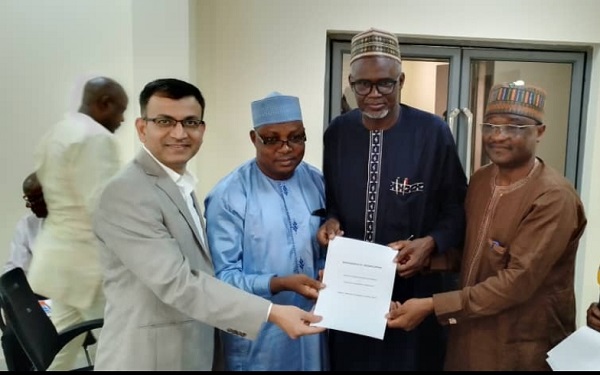
In a significant step towards fostering collaboration between the private sector and academia for the purpose of translating research into practical products and services, the National Office for Technology Acquisition and Promotion (NOTAP), PZ Cussons Nigeria PLC and beneficiary Nigerian universities have formally signed a memorandum of understanding (MoU).
The ceremony took place at NOTAP’s headquarters in Abuja.
In his speech during the ceremony, the director-general of NOTAP, Dr. DanAzumi Ibrahim underscored the importance of this project initiated by PZ Cussons. He explained that the project’s goal is to transition the nation from a resource-based economy to a knowledge-based one. According to him, research and development (R&D) plays a pivotal role in this transformation.
While acknowledging that universities have been diligently advancing research, Ibrahim stressed the need to translate this knowledge into tangible products and services. He stated, “We have competencies within the universities and resources within the university base, but as long as we don’t translate the knowledge into products and services, we may not see the economic impact of our intervention in our economic development. So, the universities are looking at one side and the private sector is looking at [at] another side.”
Ibrahim emphasised that NOTAP, as a regulator, strives to connect the private sector with academia to ensure that R&D is translated into products and services. He said, “We feel strongly about connecting the private sector and academia”.
He went on to reveal that this project had its beginnings in 2016 when five companies sponsored five candidates to undertake research on behalf of the industries. PZ Cussons was among the sponsors that supported R&D projects at the PhD level. Currently, over 27 candidates are being sponsored by the private sector.
To facilitate credible R&D, equipment plays a critical role. Recognising that the government alone cannot provide all the necessary equipment, NOTAP collaborates with the private sector to seek their assistance in this regard.
PZ Cussons, at the outset of this initiative, upgraded three chemistry-based laboratories in the Modibbo Adama University of Technology in Yola, the University of Calabar and the National Research for Chemical Technology in Zaria. All of these facilities are chemistry-based. PZ Cussons is now expanding its support by upgrading additional laboratories across the country, one in each of the six geopolitical zones.
Each of these laboratories sees an investment of nearly N100million from PZ Cussons. These facilities are equipped with state-of-the-art equipment that matches international research center standards.
Representing PZ Cussons, Dimitri’s Kostianis, the CEO, highlighted that the MoU signed with NOTAP for the Industry Research Laboratory Upgrade Project (NIRLUP) signifies a project designed to bridge the gap between academia and industry. Its objective is to enable local industries to benefit from research conducted in academic institutions without the need for external support.
Kostianis emphasised that practical research, which can garner industry patronage, relies on the availability of adequate facilities, particularly cutting-edge equipment comparable to what internationally recognized research centers utilise.
He further disclosed that the project has already been delivered to four universities and one centre, with plans to extend it to cover all six geopolitical zones. The project’s focus is on chemistry and chemical engineering, aligning with PZ Cussons’ areas of production expertise to maximise its impact.
The vice-chancellor of the Federal University of Technology Akure, Mrs. Adenki Oladeji expressed appreciation to PZ Cussons for their substantial contribution to academia. She emphasised the pivotal role research plays in the country’s development, stating, “If we are able to develop our research, we are developing our country”.
In conclusion, this MoU signing marks a significant stride towards strengthening collaboration between academia and industry in Nigeria, with the potential to drive innovation and contribute to the nation’s transition to a knowledge-based economy.

